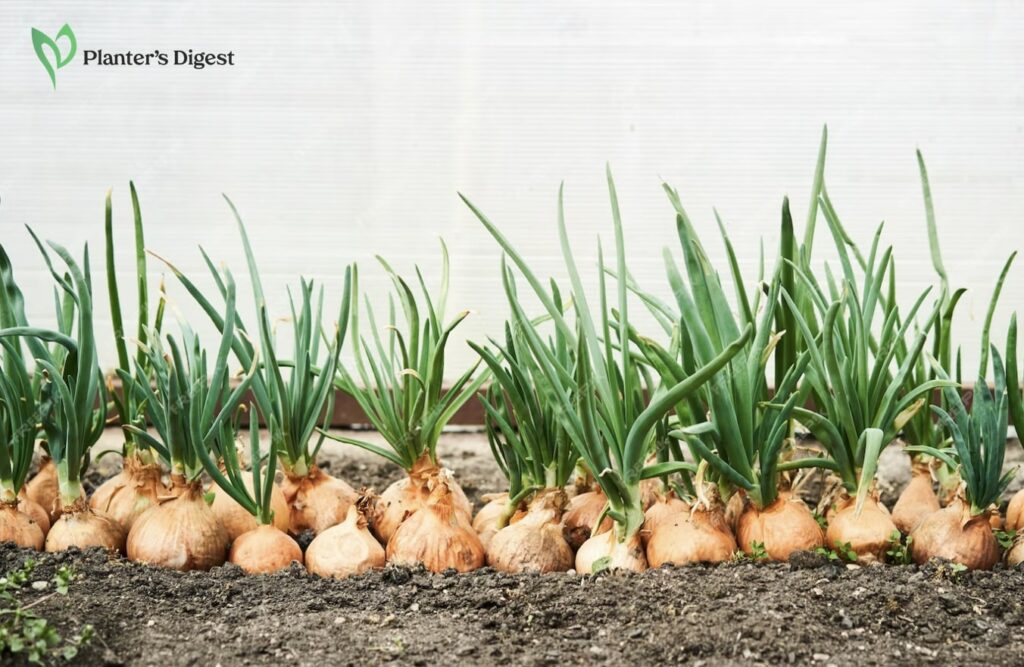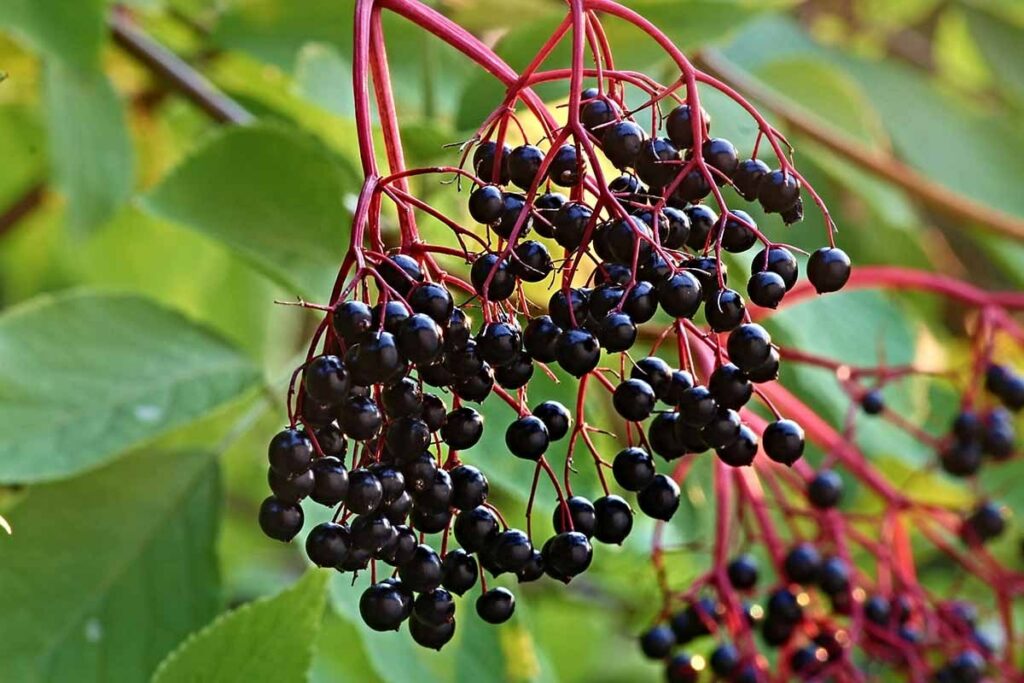Have your onions sprouted from sitting for a while in your pantry? Don’t throw them away just yet!
You can plant them and save money by growing your onions from these sprouts. In this guide, we’ll walk you through the entire process, and we’re sure you’ll have a fun and rewarding experience come harvest time.
Why do onions sprout?
Sprouting is an onion’s natural way to reproduce. Once the onion is exposed to moisture, warmed and light, it will sprout and grow into a new plant.
Onions sprout even if they are not planted in the ground. So, if you want to prevent sprouting, make sure to store your onions in a cool, dry and dark place with temperatures between 32 to 40 degrees Fahrenheit to slow down the sprouting process.
How To Plant Sprouted Onions
Here are the required growing conditions for planting sprouted onions.
| Characteristics | Description |
| Location | Sunny area with well-drained soil |
| Soil Preparation | Add compost into the soil for a rich planting bed |
| Soil | Well-drained, fertile soil with a pH of 6.0 to 6.8 |
| Sunlight | Full sun At least 6 hours per day |
| Temperature | Cool-weather temperatures 60 to 70 degrees Fahrenheit |
| Planting Depth | The top of the onion is 1 inch below the surface of the soil |
| Spacing | 4 to 6 inches apart |
| Watering | Keep the soil moist but not soggy |
| Fertilizer | Apply balanced fertilizer after planting and every 2 to 3 weeks |
| Harvesting | 60 to 90 days after planting Harvest when the onion tops begin to yellow and fall over |
Here’s the step-by-step process of planting them!
1. Remove the skin and separate the onion into sections.
| Difficulty | Easy ●○○○○ |
| Duration | 15 to 30 minutes |
| Things You Need | Sprouted onion Knife |
How To Do
1. Peel off the outer layer of skin. Make sure not to damage healthy leaves growing at the top of the onion.
2. Remove brown or black leaves.
3. Keep peeling the layers until you see one or more sprouts bunched at the center of the onion.
4. Cut off the top of the sprouted onion, about 1 inch below the sprout.
5. Make a cut down the center of the onion, from the top to the bottom.
6. Carefully separate the onion into sections using your fingers or a knife.
7. Make sure each sprout gets some roots.
2. Soak the sprouts to grow larger roots.
| Difficulty | Easy ●○○○○ |
| Duration | 15 to 30 minutes |
| Things You Need | Sprouted onion Bowl of water |
How To Do
1. Pour water into a bowl, enough to cover the roots and for the roots to absorb it.
2. Place the sprouts in the container.
3. Make sure that the roots have access to the water.
4. Put the container where it will get plenty of sunlight Change the water every day or two to keep it fresh.
5. The onions will grow softer roots in a week or more.
3. Transplant the onion sprouts.
| Difficulty | Easy ●○○○○ |
| Duration | 15 to 30 minutes |
| Things You Need | Sprouted onion Trowel Pot or garden bed Compost Water |
How To Do
1. Choose a spot for your transplanted onion sprouts that gets full sun and has well-drained soil.
2. Mix some compost or aged manure into your garden soil.
3. Dig a hole twice as wide as the onion sprout’s root ball.
4. Place the onion sprout in the hole, leaving only the green part of the plant above the ground.
5. Dedicate 4 to 6 inches of space between onions.
6. Gently backfill with soil, tamping down to remove any air pockets.
7. Water the onion sprout thoroughly.
8. Keep the soil moist but not soggy.
4. Harvest the onions.
| Difficulty | Easy ●○○○○ |
| Duration | 15 to 30 minutes |
| Things You Need | Shovel Knife Basket |
How To Do
1. When the tops of your onion plants have turned yellow and fallen over, it is time to harvest. This is usually about 60-90 days after planting.
2. Use a shovel or spade to loosen the soil around the onion bulbs carefully.
3. Lift the onion bulbs from the ground and brush off any excess dirt.
4. Cut off the tops of the onion plants, leaving about 1 inch of stem attached to the bulb.
5. Place the onions in a basket or container to store.
How To Make Onions Sprout Faster
If you want to make your onions sprout faster, place them in a warm and moist environment.
The ideal temperature for onion sprouting is between 60 and 70 degrees Fahrenheit. You can also place them in a pot or garden bed where they will receive full sun.
Another way to make onions sprout faster is by storing them with fruits or vegetables that give off ethylene gas, like tomatoes, potatoes and bananas. They will speed up the sprouting process.
Can you eat a sprouted onion?
You can eat sprouted onions, which are often softer and more bitter than regular ones. Sprouted onions have more protein, which makes them a favorite ingredient for vegetarian and vegan dishes.
Onion bulbs use their stored sugars to sprout, so the sprouted onion tastes more bitter when raw. It also has a leathery texture and gives a more pungent scent and flavor.
It’s best to cook them until they are soft and easy to chew. Sprouted onions are usually added to salads, soups, stews, stir-fries and sauces.
Before eating sprouted onions, make sure to cut off any black spots or parts covered in mold. If the flesh is brown and smells of sulfur, the decomposition process has begun, and you should throw out the entire onion or add them to your compost pile.
How often should I water my sprouted onion plant?
You should water your sprouted onion plant once every 2 to 3 days or when the top inch of the soil is already dry. Onion plants need regular watering to protect them from pests and diseases.
However, make sure not to overwater your onion plants to prevent them from waterlogging and suffering from root rot.
It’s best to use lukewarm water to prevent shock to the plant and remember to water your onion plant at the base to ensure that the water reaches the roots, where it’s most needed.
FAQs on Planting Sprouted Onions
You should change the water on sprouted onions once every 24 to 36 hours so the water will not stagnate and cause the onion or its newly grown roots to rot.
You can regrow green onions by cutting off the bottom inch of the white bulb, growing new roots and planting them back in the soil.
Onions need 6 to 8 inches of space from other plants to grow large bulbs.
The best time of the year to plant onions is in late March or April. However, you can also plant them 6 to 8 weeks before the first frost date to give the onions time to establish their roots before the winter season.
Onions are ready for harvest when the green shoots and flower heads turn brown and wilt. Once you see things, harvest the onions immediately before they develop mold or rot.
Sprouted onions will not grow into full-grown onions and typically produce oval-shaped onions that resemble shallots. They are commonly added to stews and casserole dishes.
The best time to plant a sprouted onion is in the spring when the soil has warmed up and before the heat of summer arrives.
You should use well-drained, loamy soil for planting a sprouted onion because it provides the right balance of nutrients and moisture the plant needs.





